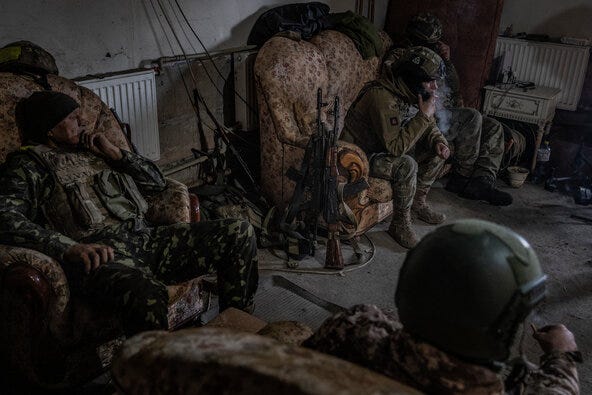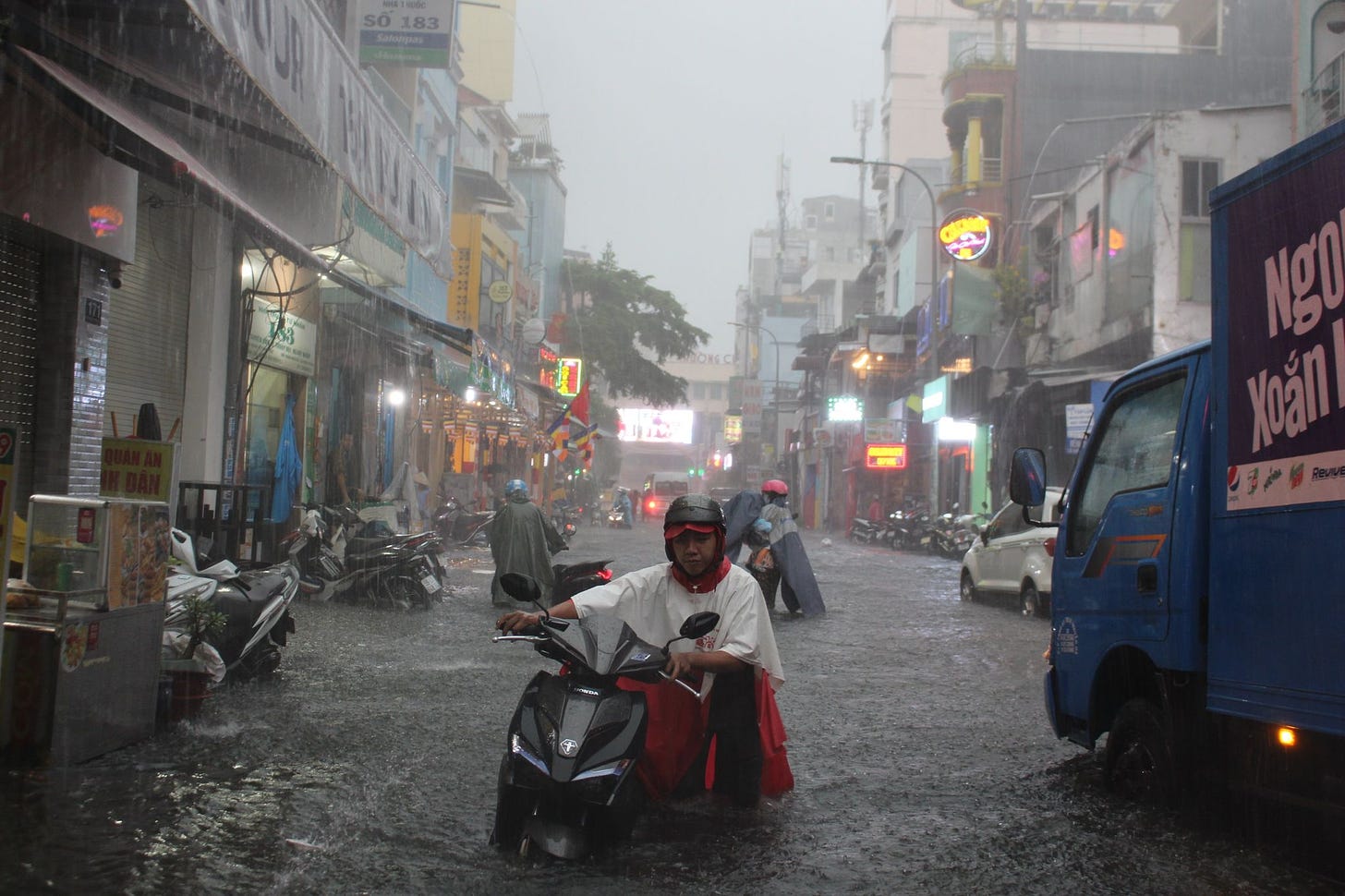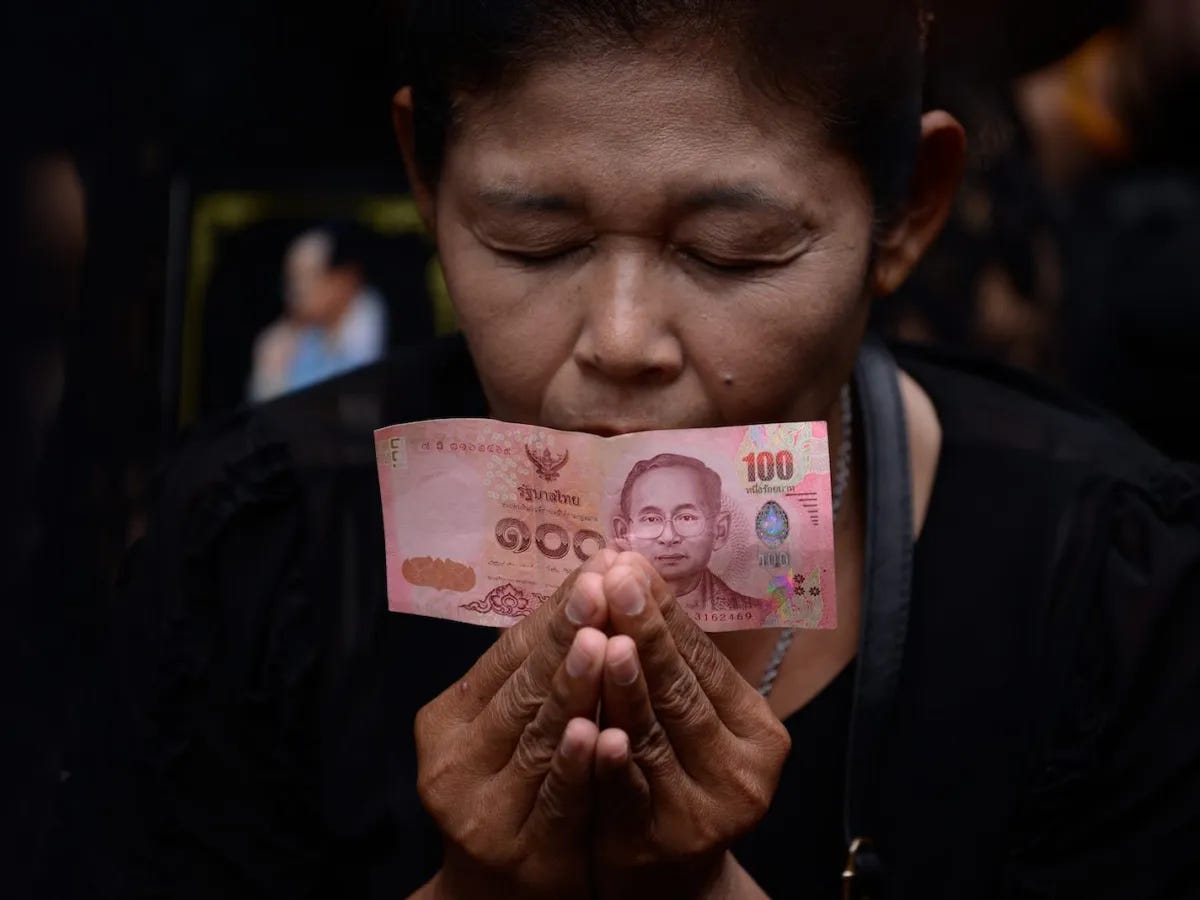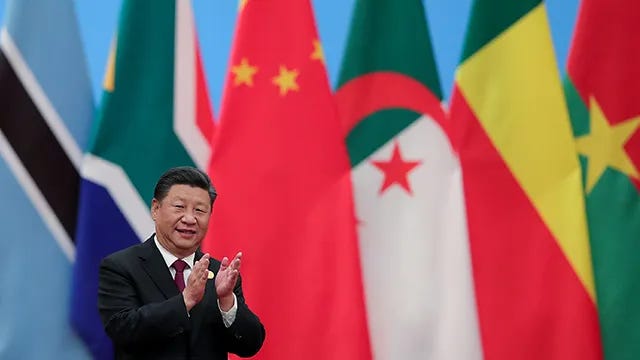Conflict Fatigue
West subsidised Ukraine from start, impose on Russia the will of USA, Vietnam’s recovery was cut short, Japan, Sth Korea & Thai currencies under pressure, White Paper - the shared home of humanity.
UPDATE: It is now almost 600 days since Russia launched its Special Military Operation (SMO) in Ukraine, and the war that has followed has tested the resilience of both countries. But it has also tested those in the west that have subsidised Ukraine from the start.
Unthinkable: The overall or political object is to impose upon Russia the will of the United States and British Empire. Even though ‘the will’ of these two countries may be defined as no more than a square deal for Poland, that does not necessarily limit the military commitment. A quick success might induce the Russians to submit to our will at least for the time being; but it might not. That is for the Russians to decide. If they want total war, they are in a position to have it.
Vietnam’s recovery was cut short as strong headwinds hit the economy in late 2022 and during the first half of 2023. Financial stress among real estate developers emerged due to tighter funding conditions, a slowdown in sales, and legal hurdles, while the corporate bond market froze amidst a loss of investor confidence. Exchange rate pressures mounted throughout 2022 as global interest rates rose sharply, and a major domestic bank suffered a deposit run in October 2022 and was placed under the State Bank of Vietnam's control.
Fed's higher-for-longer stance weighs increasingly on Asian markets. The currencies of Japan, South Korea and Thailand came under selling pressure and traded near their lowest levels for the year on Wednesday as higher interest rates both at home and abroad have started weighing on regional economies.
In the universe there is only one Earth, the shared home of humanity. Unfortunately, this planet on which we rely for our subsistence is facing immense and unprecedented crises, both known and unknown, both foreseeable and unforeseeable. Whether human civilization can survive these has become an existential issue that must be squarely faced. More and more people have come to the realization that rather than amassing material wealth, the most pressing task is to find a guiding beacon for the sustainable development of human civilization, because we all care about our future.
Ukraine conflict fatigue
By Stefan Wolff (amended)
It is now almost 600 days since Russia launched its Special Military Operation (SMO) in Ukraine, and the war that has followed has tested the resilience of both countries. But it has also tested those in the west that have subsidised Ukraine from the start.
This much was evident from the mixed reception Ukraine’s president, Volodymyr Zelensky, received last week when he visited the US and Canada. Meanwhile, tensions in Europe over support for Ukraine have flared up again.
With the Ukrainian counteroffensive still not living up to – the perhaps inflated – expectations, we are beginning to see the first serious signs of a fraying consensus in the west about how seriously different governments are committed to supporting Ukraine for as long as it takes.
Zelensky’s North American visit started with a speech at the UN general assembly in New York in which he made a passionate appeal to fellow world leaders to uphold international law and order and support his country. While there remains widespread backing for the principles of sovereign equality and territorial integrity, it gets fuzzier when it comes to how to end the war.
There are two camps: many western leaders following Ukraine’s line that the country’s territorial integrity needs to be restored first. Others – including a large number of countries in the global south – prefer to emphasise the importance of dialogue and an early cessation of violence.
This pattern was repeated the following morning at the UN security council’s open debate on the war in Ukraine, with a predictable clash between Zelensky and the Russian foreign minister, Sergey Lavrov, who presented very different accounts of causes and dynamics of the war. But before the debate could conclude, the security council turned its attention to the crisis in Nagorno-Karabakh, a clear indication that Ukraine is not the only urgent issue on the global agenda.
Zelensky continued to Washington DC where he secured another military aid package worth US$325 million (£192 million). This aid can be allocated by US president Joe Biden directly under the so-called presidential drawdown authority.
A further US$24 billion in aid, which is subject to congressional approval, is more problematic. The Republican House majority leader, Kevin McCarthy, would not commit to putting a bill to that effect on the legislative schedule before the end of the year.
McCarthy also denied the Ukrainian president an opportunity to address a joint session of the House and the Senate, another sign of growing Republican resistance to the enthusiastic support offered to Ukraine by the Biden administration.
Moving up to Canada, Zelensky received a universally warm reception and left with a military aid package worth C$650 million (£394 million).
Europe: growing division
Meanwhile, in Europe, three of Kyiv’s neighbours inside the EU – Hungary, Poland and Slovakia – defied the end of an EU-wide ban on grain imports from Ukraine. Poland then went one step further and also put a – temporary – halt on any weapons deliveries to Ukraine. This was decried by Zelensky in his speechbefore the UN general assembly as “political theatre” and a gift for Moscow.
The grain dispute between Poland and Ukraine has been simmering for some time, and it was a question of when, not if, it would ultimately escalate. Importantly, it foreshadows other potential obstacles in Ukraine’s path to EU membership.
Some of these are potentially within Ukraine itself. As Ursula von der Leyen, the president of the European Commission, noted in her annual state-of-the-union address at the European parliament, “accession [to the EU] is merit-based”, she acknowledged “the great strides Ukraine has already made”.
But accession negotiations will not be opened before a positive recommendation from the commission on Kyiv’s progress concerning seven conditions set in June 2022 when Ukraine was granted candidate status. This decision is expected before the end of 2023.
Once accession talks start, the interests of individual EU member states will play a greater role in determining the speed at which Ukraine can progress. The current spat with Poland is but one indication of potential trouble ahead, albeit in the particularly sensitive area of the EU’s common agricultural policy. This will be deeply affected if Ukraine – a global agricultural superpower – joins.
Poland’s prime minister, Mateusz Morawiecki, clearly wants to be seen to be protecting his country’s farmers from uncompetitive practices by Ukrainian exporters, particularly in the run-up to a parliamentary election next month.
But this is also about leadership and the potential challenge that Ukrainian EU membership would pose to Poland’s ambitions to be the main voice of the bloc’s eastern members.
Such an open attack on Zelensky and his policies significantly shifts the dial in what is considered acceptable criticism of the highly charismatic Ukrainian president. It comes in the wake of growing western unease about the course and cost of the war.
This is not to say that Ukraine has not made progress since its offensive began just before the summer. In recent days, Ukraine has made further gains in the south and launched a spectacular attack on the headquarters of the Russian Black Sea fleet in occupied Crimea at the weekend.
But Ukraine’s recent successes are almost certainly not enough to dispel the growing sense that the war is becoming a lasting stalemate. Until now, western support has underwritten Ukraine’s efforts to defend itself. But it has done no more than that and is not sufficient to enable a Ukrainian victory.
If the events of last week are a sign that this support begins to weaken, the prevention of a Ukrainian defeat can no longer be taken as a given. Nor could it be argued that this was merely a defeat for Ukraine – it would also mean that the western alliance did not have the stamina to prevail in the current confrontation with Russia.
Read more here.

Operation Unthinkable
Transcript
OPERATION UNTHINKABLE
REPORT BY THE JOINT PLANNING STAFF
We have examined Operation Unthinkable. As instructed, we have taken the following assumptions on which to base our examination:
The undertaking has the full support of public opinion in the British Empire and the United States and consequently, the morale of British and American troops continues high.
Great Britain and the United States have full assistance from the Polish armed forces and can count upon the use of German manpower and what remains of German industrial capacity.
No credit is taken for assistance from the forces of the other Western Powers, although any bases in their territory, or other facilities which may be required, are made available
Russia allies herself with Japan.
The date for the opening of hostilities is 1st July, 1945.
Redeployment and release schemes continue till 1st July and then stop.
Owing to the special need for secrecy, the normal staff in Service Ministries have not been consulted.
OBJECT
The overall or political object is to impose upon Russia the will of the United States and British Empire.
Even though ‘the will’ of these two countries may be defined as no more than a square deal for Poland, that does not necessarily limit the military commitment. A quick success might induce the Russians to submit to our will at least for the time being; but it might not. That is for the Russians to decide. If they want total war, they are in a position to have it.
The only way we can achieve our object with certainty and lasting results is by victory in a total war but in view of what we have said in paragraph 2 above, on the possibility of quick success, we have thought it right to consider the problem on two hypotheses:-
That a total war is necessary, and on this hypothesis we have examined our chances of success.
That the political appreciation is that a quick success would suffice to gain our political object and that the continuing commitment need not concern us.
TOTAL WAR
Apart from the chances of revolution in the USSR and the political collapse of the present regime – on which we are not competent to express an opinion – the elimination of Russia could only be achieved as a result of:
the occupation of such areas of metropolitan Russia that the war making capacity of the country would be reduced to a point at which further resistance became impossible.
Such a decisive defeat of the Russian forces in the field as to render it impossible for the USSR to continue the war.
Occupation of Vital Areas of Russia
The situation might develop in such a way that Russians succeeded in withdrawing without suffering a decisive defeat. They would then presumably adopt the tactics which they had employed so successfully against the Germans and in previous wars of making use of the immense distances with which their territory provides them. In 1941 the Germans reached the Moscow area, the Volga and the Caucasus, but the technique of factory evacuation, combined with the development of new resources and Allied assistance, enabled the U.S.S.R. to continued fighting.
There was virtually no limit to the distance to which it would be necessary for the Allies to penetrate into Russia in order to render further resistance impossible. It is far as, or as quickly as, the Germans in 1942 and this penetration no decisive result.
Decisive Defeat of the Russian Forces
Details of the present strengths and dispositions of the Russian and Allied forces are given in Annexes II and III and illustrated maps A and B. The existing balance of strength in Central Europe, where the Russians enjoy a superiority of approximately three to one, makes it most unlikely that the Allies could achieve a complete and decisive victory in that area in present circumstances. Although Allied organisation is better, equipment slightly better and morale higher, the Russians have proved themselves formidable opponents of the Germans. They have competent commanders, adequate equipment and an organisation which though possibly inferior by our standards, has stood the test. On the other hand, only about one third of their divisions are of a high standard, the others being considerably inferior and with overall mobility well below that of the Allies.
To achieve the decisive defeat of Russia in a total war would require, in particular, the mobilisation of manpower to counteract their present enormous manpower resources. This is a very long term project and would involve:-
The deployment in Europe of a large proportion of the vast resources of the United States.
The re-equipment and re-organisation of German manpower and of all the Western Allies.
Conclusions
We conclude that:-
That if our political object is to be achieved with any certainty and with lasting results, the defeat of Russia in a total war will be necessary.
The result of a total war with Russia is not possible to forecast, but the one thing certain is that to win it would take us a very long time.
QUICK SUCCESS
It might, however, be considered, as result of a political appreciation, that a quick and limited military success would result in Russia accepting out terms.
Before a decision to open hostilities were made, full account would have to taken of the following:-
If this appreciation is wrong and the attainment of whatever limited objective we may set ourselves does not cause Russia to submit to our terms, we may, in fact, be committed to a total war.
It will not be possible to limit hostilities to any particular area. While we are in progress, therefore, we must envisage a world-wide struggle.
Even if all goes according to plan, we shall not have achieved, from the military point of view, a lasting result. The military power of Russia will not be broken and it will be open to her to recommence the conflict at any time she sees fit.
Assuming, however, that it is decided to risk military action on a limited basis, accepting the dangers set out above, we have examined what action we could take in order to inflict such a blow upon the Russians as would cause them to accept our terms, even though they would not have been decisively defeated and, from the military point of view, would still be capable of continuing the struggle.
Read more here.
IMF Vietnam Report
Vietnam experienced a robust post-pandemic economic recovery in 2022 thanks to strong economic fundamentals and prudent public health management during the pandemic. GDP rose by a historically high 8 percent—the highest since the 1990s—driven by strong domestic and external demand. Average inflation was kept at 3.2 percent, well below the (4 percent) inflation target, although price pressures picked up during the year.
The recovery was cut short, however, as strong headwinds hit the economy in late 2022 and during the first half of 2023. Financial stress among real estate developers emerged due to tighter funding conditions, a slowdown in sales, and legal hurdles, while the corporate bond market froze amidst a loss of investor confidence. Exchange rate pressures mounted throughout 2022 as global interest rates rose sharply, and a major domestic bank suffered a deposit run in October 2022 and was placed under the State Bank of Vietnam's control.
The economy was further hit by a sharp deterioration in external demand since late 2022, with exports declining by 12 percent in the first half of 2023. Liquidity, foreign exchange, and inflationary pressures have eased, but growth decelerated significantly and is expected to slow to 4.7 percent in 2023—supported by a rebound in exports and expansionary (especially fiscal) policies. Inflation is expected to remain contained below the 4.5 percent ceiling. Vietnam can return to high growth rates over the medium term supported by structural reforms.
Executive Board Assessment
Executive Directors agreed with the thrust of the staff appraisal. They commended the authorities' swift actions to maintain macro-financial stability as the economic recovery from the pandemic faced domestic and external headwinds. They noted that risks remain elevated, and that further efforts are required to safeguard macro-financial stability and deepen reforms to address vulnerabilities and ensure robust, green, and inclusive growth over the medium term. Continued capacity development will be important to support reforms.
Directors noted that, given ample fiscal space and limited room for monetary policy loosening, fiscal policy should take the lead in supporting economic activity if needed. In this context, Directors welcomed the authorities' plans to speed up the implementation of public investment, which will require tackling bottlenecks, and stressed the importance of expanding social safety nets to support the most vulnerable. Directors recommended strengthening the fiscal framework and budget process and increasing revenue mobilization over the medium term to support the ambitious development agenda.
Directors commended the authorities for effectively containing inflation risks but stressed that monetary policy should continue to be cautious under a complex environment and limited policy space. They welcomed steps toward greater exchange rate flexibility and encouraged continued progress in this area, along with modernizing the monetary policy framework.
Directors underscored the importance of strengthening the resilience of the financial system by bolstering capital buffers, phasing out regulatory forbearance, and addressing rising non-performing loans. They also stressed the need to enhance the authorities' toolkit to prevent and manage banking crises by strengthening the resolution and emergency liquidity frameworks, and welcomed the ongoing revision of the law on credit institutions. Efforts to strengthen bank regulation and supervision should continue.
Directors acknowledged the authorities' swift actions to contain risks in the real estate and corporate bond market. They urged decisive steps to address remaining risks, including by strengthening the insolvency framework, bolstering institutions, and increasing transparency in the corporate bond market.
Directors stressed the importance of structural and climate reforms to achieve sustainable, green, and inclusive growth. Accelerating the transition to upper-middle income status will require further efforts to improve the business environment, step-up critical infrastructure, and invest in human capital. Directors welcomed the latest Power Development Plan and the planned Emissions Trading System to help achieve Vietnam's climate goals and promote energy security. They emphasized the importance of moving ahead with implementation of the strategy and developing the appropriate regulatory framework to promote investment in renewable energy and secure funding for the green transition. Conducting a Climate-Public Investment Management Assessment would be useful.
Directors welcomed the authorities' anti-corruption efforts and emphasized the need to continue strengthening governance, improving the AML/CFT framework, and simplifying regulatory frameworks. Greater efforts in closing data gaps will be important.
The next Article IV Consultation with Vietnam is expected to be held on the standard 12-month cycle.
View in full here.
Yen, Won, and Baht struggle
By Nikkei Asia (amended)
Fed's higher-for-longer stance weighs increasingly on Asian markets. The currencies of Japan, South Korea and Thailand came under selling pressure and traded near their lowest levels for the year on Wednesday as higher interest rates both at home and abroad have started weighing on regional economies.
The Japanese yen, South Korean won and Thai baht all recently slumped to their lowest levels against the dollar this year. Their weakness comes as the U.S. central bank maintained hawkish rhetoric, raising the prospects of further rate hikes and widening the rate differentials between U.S. and Asian economies.
The yen remains above 149 yen per dollar, near the 11-month low recorded on Tuesday. The won fell to 1354.6 per dollar, while the baht was down to 36.5 -- both a 10-month low since November 2022.
Like the Fed, many Asian central banks raised interest rates last year, but for much of 2023 they have kept rates mostly steady, hoping that earlier rate hikes were enough to tame the inflationary tide. The U.S. Federal Reserve also kept interest rates at a 22-year high on Sept. 20 but hinted at further rate hikes, expecting robust growth and employment for 2024 and 2025.
The yen was also hit by dovish comments from Bank of Japan Gov. Kazuo Ueda, who on Sept. 22 reiterated the bank's commitment to ultra-easy monetary policy and doused speculation that the BOJ would shift to tightening as early as December.
The Japanese currency slipped to 149 against the dollar on Tuesday -- the lowest since October 2022 -- even as Japanese Finance Minister Shunichi Suzuki warned the same day that "excessive fluctuations are undesirable" and that "the Japanese currency authorities are in communication with their overseas counterparts."
Market players shrugged off the comment, however, saying they did not detect signs of urgency in Suzuki's remarks. "It will be just a matter of time before the dollar-yen rate tests 150," Mizuho Securities analysts said in a research note. At that level, many market players anticipate a yen-buying intervention by the BOJ. "The yen's downswing could accelerate if there is no intervention," the analysts said.
Ueda's dovish rhetoric reflected persistent uncertainty over outlook on the global economy. Some economists even expect Asian central banks to ease policy to support their economies. Last week, the Asian Development Bank lowered its 2023 growth forecast for developing Asia to 4.7% from 4.8% as high interest rates and China's property crisis pose growing risks.
The Chinese yuan fell to 7.34 yuan per dollar earlier in September, the lowest since December 2007. The dollar now trades near this low at 7.30 yuan.
On Wednesday, Nomura economists said they maintain their view that the Bank of Korea will start cutting rates in January.
Economists at Capital Economics equally have a downbeat view of emerging Asia.
"GDP growth across most of Emerging Asia has struggled over the past year and we expect growth to remain weak in the near term as tight monetary policy at home and subdued activity abroad weigh on demand," they said.
Capital Economics expects Bank Indonesia will start cutting rates by the end of the year, and the Philippines and Thailand in the first quarter of 2024.
Read more here.
A Global Community of Shared Future: China's Proposals and Actions
State Council Information Office of China/Xinhua
BEIJING, Sept. 26 -- China's State Council Information Office on Tuesday released a white paper titled "A Global Community of Shared Future: China's Proposals and Actions."
In the universe there is only one Earth, the shared home of humanity. Unfortunately, this planet on which we rely for our subsistence is facing immense and unprecedented crises, both known and unknown, both foreseeable and unforeseeable. Whether human civilization can survive these has become an existential issue that must be squarely faced. More and more people have come to the realization that rather than amassing material wealth, the most pressing task is to find a guiding beacon for the sustainable development of human civilization, because we all care about our future.
Ten years ago President Xi Jinping propounded the idea of building a global community of shared future, answering a question raised by the world, by history, and by the times: “Where is humanity headed?” His proposal lights the path forward as the world fumbles for solutions, and represents China’s contribution to global efforts to protect our shared home and create a better future of prosperity for all.
To build a global community of shared future, all peoples, all countries, and all individuals – our destinies being interconnected – must stand together in adversity and through thick and thin, navigating towards greaterharmony on this planet that we call home. We should endeavor to build an open, inclusive, clean and beautiful world that enjoys lasting peace, universal security, and common prosperity, turning people’s longing for a better life into reality.
The vision of a global community of shared future bears in mind the wellbeing of all humanity. It is based on both observation of the present and visionary planning for the future. It lays out goals, charts the path, and offers action plans to achieve them. It concerns the future of humanity and the destiny of every human being.
President Xi Jinping first raised the vision of a global community of shared future when addressing the Moscow State Institute of International Relations in 2013. Over the past decade it has been steadily enriched. He fleshed it out with a five-point proposal[1] in his speech at the General Debate of the 70th Session of the UN General Assembly in 2015. He further proposed five goals for the world[2] in his speech at the United Nations Office in Geneva in 2017. This represents the steady increase in the depth and scope of the vision.
The past decade has seen steady progress in implementing the vision. From bilateral to multilateral and from regional to global dimensions, ground-breaking results have been achieved on every front. The Belt and Road Initiative, the Global Development Initiative, the Global Security Initiative, and the Global Civilization Initiative have taken root and borne fruits, bringing prosperity and stability to the world and creating substantive benefits for the people.
Over the past decade, the vision of a global community of shared future has gained broader support. More countries and people have come to the understanding that this vision serves the common interests of humanity, represents popular calls for peace, justice and progress, and can create the greatest synergy among all nations for building a better world. It is now widely recognized in the international community that the vision has nothing to do with self-interest and protectionism. Instead, by presenting China’s vision of the course of human development, it confronts the hegemonic thinking of certain countries that seek supremacy. It is therefore of great significance to promote solidarity and cooperation among all countries and create a better future for humanity.
The Chinese government is publishing this white paper to introduce the theoretical base, practice and development of a global community of shared future. We hope it will improve understanding and expand consensus in the international community, and reinforce the global effort to realize this vision.
[1] The five points are: We should build partnerships in which countries treat each other as equals, engage in extensive consultation, and enhance mutual understanding. We should create a security environment featuring fairness, justice, joint efforts, and shared interests. We should promote open, innovative and inclusive development that benefits all. We should increase inter-civilization exchanges to promote harmony, inclusiveness, and respect for differences. We should build an ecosystem that puts Mother Nature and green development first.
[2] The five goals are: We should build a world of lasting peace through dialogue and consultation. We should build a world of common security for all through joint efforts. We should build a world of common prosperity through win-win cooperation. We should build an open and inclusive world through exchanges and mutual learning. We should make our world clean and beautiful by pursuing green and low-carbon development.
Full Text: A Global Community of Shared Future: China's Proposals and Actions







